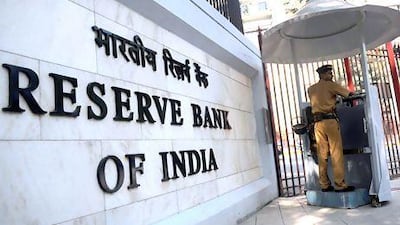The Indian rupee tumbled to another record against the dollar yesterday as liquidity measures announced by the central bank resulted in confusion in the markets.
The Reserve Bank of India (RBI) late on Tuesday announced measures including the injection of 80 billion rupees (Dh4.56bn) into the country's banking system by buying long-term government bonds on Friday.
The move is aimed at bringing down bond yields and increasing liquidity.
The benchmark S&P BSE Sensex initially rose in reaction yesterday as banking stocks rallied, while government bond yields eased. But the index spiralled downwards in afternoon trading and closed down 1.86 per cent. The rupee continued its decline and fell to an all-time low of 64.6 against the US dollar.
The RBI last month took steps to tighten liquidity and raise borrowing costs in an effort to support the rupee, so the latest move is seen as a reversal of the central's banks monetary stance.
Rajeev Malik, a senior economist at the financial services company CLSA, said the RBI's liquidity tightening steps had been "convoluted" and had "created more uncertainty instead of offering clarity".
The RBI defended its stance.
"It is important to address the risks to macroeconomic stability from external sector imbalances," it said.
"At the same time, it is also important to ensure that the liquidity tightening does not harden longer term yields sharply and adversely impact the flow of credit to the productive sectors of the economy."
Other measures it took included relaxing rules for banks on mandatory bond holdings.
A wave of decisions revealed by the government and the central bank in recent days has done little to stem the currency's slide. An exodus from emerging markets was triggered by signals that the US Federal Reserve would wind down its stimulus programme. Indian stock markets and bond markets have been hit hard in recent sessions, as foreign investors have pulled out funds.
"India has been one of the worst affected countries by the recent rout in emerging markets," said Capital Economics.
"Renewed concerns among investors about a shift in the Fed's monetary policy stance have played their part but India's own particular vulnerabilities - notably a less positive growth picture and a sizeable current account deficit - have also been drivers of the sell-off.
"These factors are likely to continue to undermine India's financial markets in the coming months, but we do not expect there to be a full-blown crisis."
HSBC said that expectations of the Fed tapering its stimulus would intensify, while uncertainty over policy response in India would continue.
"The beginning of the withdrawal of excess global liquidity has varying ramifications for Asian bond markets," HSBC's Andre De Silva and Himanshu Malik wrote yesterday.
"India and Indonesia are the most exposed as they rely on foreign investments to finance wider current account deficit. This is already reflected in the significant currency weakness, surge in local government bond yields and outflows from the bond and equity markets."

